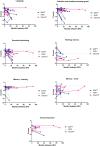Cognitive profiles discriminate between genetic variants of behavioral frontotemporal dementia
- PMID: 32052166
- PMCID: PMC7293665
- DOI: 10.1007/s00415-020-09738-y
Cognitive profiles discriminate between genetic variants of behavioral frontotemporal dementia
Erratum in
-
Correction to: Cognitive profiles discriminate between genetic variants of behavioral frontotemporal dementia.J Neurol. 2020 Jun;267(6):1613-1614. doi: 10.1007/s00415-020-09784-6. J Neurol. 2020. PMID: 32219556 Free PMC article.
Abstract
Introduction: Trials to test disease-modifying treatments for frontotemporal dementia are eagerly awaited and sensitive instruments to assess potential treatment effects are increasingly urgent, yet lacking thus far. We aimed to identify gene-specific instruments assessing clinical onset and disease progression by comparing cognitive functioning between bvFTD patients across genetic mutations.
Methods: We examined differences in 7 cognitive domains between bvFTD patients with GRN (n = 20), MAPT (n = 29) or C9orf72 (n = 31) mutations, and non-carriers (n = 24), and described longitudinal (M = 22.6 months, SD = 16.6) data in a subsample (n = 27).
Results: Patients showed overall cognitive impairment, except memory recall, working memory and visuoconstruction. GRN patients performed lower on executive function (mean difference - 2.1; 95%CI - 4.1 to - 0.5) compared to MAPT and lower on attention compared to MAPT (mean difference - 2.5; 95%CI - 4.7 to - 0.3) and C9orf72 (mean difference - 2.4; 95%CI - 4.5 to - 0.3). Only MAPT patients were impaired on delayed recall (mean difference - 1.4; 95%CI - 2.1 to - 0.7). GRN patients declined rapidly on attention and memory, MAPT declined in confrontation naming, whereas C9orf72 patients were globally impaired but remained relatively stable over time on all cognitive domains.
Discussion: This study shows gene-specific cognitive profiles in bvFTD, which underlines the value of neuropsychological tests as outcome measures in upcoming trials for genetic bvFTD.
Keywords: Cognition; FTD; Frontotemporal dementia; Genetic; Neuropsychology.
Conflict of interest statement
The authors declare that they have no conflict of interest.
Figures

References
-
- Arighi A, Fumagalli GG, Jacini F, Fenoglio C, Ghezzi L, Pietroboni AM, De Riz M, Serpente M, Ridolfi E, Bonsi R. Early onset behavioral variant frontotemporal dementia due to the C9ORF72 hexanucleotide repeat expansion: psychiatric clinical presentations. J Alzheimer's Dis. 2012;31:447–452. - PubMed
-
- Balthazar MLF, Yasuda CL, Pereira FRS, Bergo FPG, Cendes F, Damasceno BP. Coordinated and circumlocutory semantic naming errors are related to anterolateral temporal lobes in mild AD, amnestic mild cognitive impairment, and normal aging. J Int Neuropsychol Soc. 2010;16:1099–1107. - PubMed
-
- Boeve BF. Links between frontotemporal lobar degeneration, corticobasal degeneration, progressive supranuclear palsy, and amyotrophic lateral sclerosis. Alzheimer Dis Assoc Disord. 2007;21:S31–S38. - PubMed
-
- Cees De Groot J, De Leeuw FE, Oudkerk M, Van Gijn J, Hofman A, Jolles J, Breteler MMB. Cerebral white matter lesions and cognitive function: the Rotterdam Scan Study. Ann Neurol. 2000;47:145–151. - PubMed
MeSH terms
Substances
Grants and funding
LinkOut - more resources
Full Text Sources
Miscellaneous

